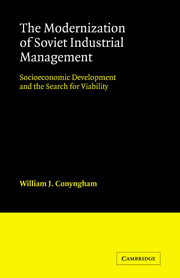 The Modernization of Soviet Industrial Management
The Modernization of Soviet Industrial Management Book contents
4 - Modernizing the methods of management
Published online by Cambridge University Press: 07 October 2011
Summary
Over the past two decades, perhaps the most complex and least successful aspect of the modernization of industrial management has been the effort to change the behavioral patterns of enterprise managers and labor. The basic objectives have been reasonably clear. The most important task has been to find methods of influencing managerial choice in order to achieve greater integration of the macro- and microeconomics. The second need has been to increase labor productivity.
The closely related objectives are distinct. To achieve greater integration by channeling managerial behavior is primarily a problem of regulating pervasive system conflicts of economic and social interests. Motivating a greater degree of cooperation and productivity is rooted, however, not only in industrial organization but also in the larger social and cultural environment. Effective rationalization of the methods of management extends beyond the enterprise, particularly with respect to labor.
The issue in the solution of both problems is how to regulate behavior in complex organizational systems in order to reduce the gap between formal and informal organizations. Theoretically, the issue touches the foundation of the political system. Since the ouster of Khrushchev in 1964, however, the political leadership has rejected either a return to comprehensive administrative controls or a far-reaching adaptation of formal organization to the pressures of the informal system. This has meant a modification rather than a basic overhauling of the classical model of management.
- Type
- Chapter
- Information
- The Modernization of Soviet Industrial ManagementSocioeconomic Development and the Search for Viability, pp. 131 - 174Publisher: Cambridge University PressPrint publication year: 1982


